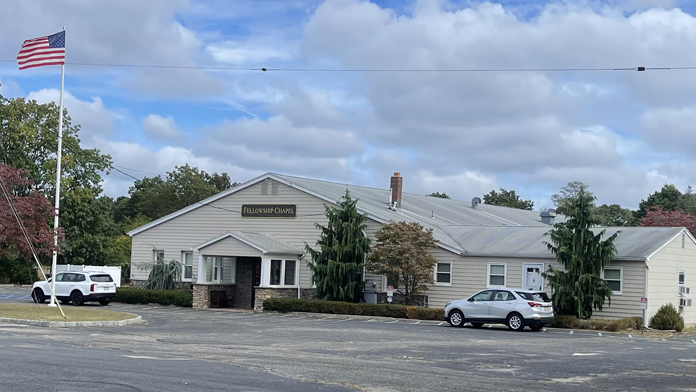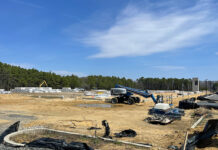
BRICK – A controversial application that would allow a “homeschool pod” to operate on the grounds of an existing church had its fifth hearing before the township’s Board of Adjustment recently.
An ancillary building would be used for the school on the four-acre site of Fellowship Chapel, located at 170 Duchess Road, which is surrounded by a residential community of single family homes.
The school, which would operate independently of the church, would be a second principal use for the site (in addition to the Fellowship Church), which was granted a Conditional Use by the Board in the original 2011 ordinance.
Schools and churches are considered a Conditional Use in residential areas, which means they can operate if they meet certain conditions.
The most recent meeting centered on those conditions not being met for a school, which includes laws regarding the maximum lot coverage, landscaping buffers, building coverage and setbacks, which cannot be changed since they are all preexisting conditions, argued the applicant’s attorney Richard C. Sciria.
Also, schools are required to have frontage on a “higher-order” (higher speed and higher volume) roadway and not just on a “lower-order” residential street.
Sciria and planner Marc S. Leber testified in favor of the Use Variance for the church since a school is considered an “inherently beneficial use” to a community in New Jersey land law.
“There is nothing in the ordinance that prohibits two principal uses,” Sciria said, and the two uses would be mitigated by the fact that they would have traffic on different days. The school would operate Monday-Thursday and the church holds services on Sundays, he said.
Township Planner Tara Paxton asked Leber if the application poses any significant detriments.
Paxton said the second principal use as a school is more intense than a house of worship, which only has substantial traffic on worship day.
Board Chairman David Chadwick added that when the church was granted a variance for a house of worship in 2011, it was based on traffic only during times of worship.
At the time, the congregation numbered about 200 people, but the current membership of Fellowship Chapel is currently about 55 or 60, he said. “It seems that [a school’s] impact on that street would be pretty substantial, at least a five-fold increase,” he said.
Chadwick said his chief concern is public school buses operating on Duchess Lane at the same time children would be dropped off at the school, resulting in a high volume of traffic in a condensed period of time.
What followed was a nearly two-hour discussion on what number of vehicles constitutes a significant impact on traffic. Sciria’s proposal that staggered drop-off times be set as a condition in the application, and much more.
Leber said his client is not proposing any changes to the property. The lot coverage (percentage of land covered by buildings or asphalt) is an existing condition, street access is an existing condition, and the application would have set conditions that any future changes would have to come back before the Board for approval.
Scores of Duchess Lane and neighboring residents have been attending the meetings because they are worried that once a school Use Variance is granted, that Use could be carried through to a larger school in the future.
John Barone, who lives on Algonquin Trail, which connects to Duchess Lane, said he is concerned about traffic since four different school buses have stops across from Fellowship Chapel.

“[Allowing a school] would open the flood gates, because if they ever sell the property they could maybe open a bigger school,” he said.
A Duchess Lane resident (who preferred not to give her name) said she was worried that a school Use Variance would be attached to the property.
“So if the pastor decides to sell the property, the variance allows for a school, and a large school could amend the variance and could cause a bigger issue,” she said.
The homeschool, run by Rebecca Snegon of the Liberty School Association, bills itself as “offering a fresh air, free to choose, full curriculum school alternative.”
She said the homeschool group formed during COVID when parents needed to work and some of the children would be homeschooled together.
“People liked what we were doing, so we needed more space,” Snegon said after the meeting.
While she didn’t have an exact number of how many children would attend the school if the variance is passed, she estimated 25-27.
“We’ve looked elsewhere, but the rents are so expensive,” she said. “We don’t want to charge too much. We want to help people, not make money off them.”
She said Fellowship Church has not named what the cost would be for the use of their ancillary building, but Snegon, who is a member of the congregation, said the church wanted to see the home school “get back on our feet,” and would figure out the rent later.
“They have backed us and what we stand for, wholeheartedly,” she said.
The next hearing for the application is scheduled for Tuesday, December 10 at 7. Due to the expected large crowd, the meeting will be held at the Civic Plaza.







